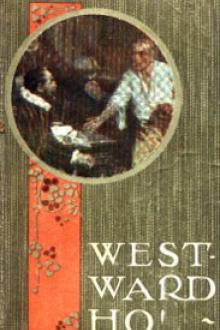Westward Ho! Or, The Voyages and Adventures of Sir Amyas Leigh, Knight, of Burrough, in the County of Devon, in the Reign of Her Most Glorious Majesty Queen Elizabeth by - (acx book reading .TXT) 📖

- Author: -
Book online «Westward Ho! Or, The Voyages and Adventures of Sir Amyas Leigh, Knight, of Burrough, in the County of Devon, in the Reign of Her Most Glorious Majesty Queen Elizabeth by - (acx book reading .TXT) 📖». Author -
But the said birds of ill-omen had a very considerable lien on the conscience of poor Mr. Thomas Leigh, the father of Eustace, in the form of certain lands once belonging to the Abbey of Hartland. He more than half believed that he should be lost for holding those lands; but he did not believe it wholly, and, therefore, he did not give them up; which was the case, as poor Mary Tudor found to her sorrow, with most of her “Catholic” subjects, whose consciences, while they compelled them to return to the only safe fold of Mother Church (extra quam nulla salus), by no means compelled them to disgorge the wealth of which they had plundered that only hope of their salvation. Most of them, however, like poor Tom Leigh, felt the abbey rents burn in their purses; and, as John Bull generally does in a difficulty, compromised the matter by a second folly (as if two wrong things made one right one), and petted foreign priests, and listened, or pretended not to listen, to their plottings and their practisings; and gave up a son here, and a son there, as a sort of a sin-offering and scapegoat, to be carried off to Douay, or Rheims, or Rome, and trained as a seminary priest; in plain English, to be taught the science of villainy, on the motive of superstition. One of such hapless scapegoats, and children who had been cast into the fire to Moloch, was Eustace Leigh, whom his father had sent, giving the fruit of his body for the sin of his soul, to be made a liar of at Rheims.
And a very fair liar he had become. Not that the lad was a bad fellow at heart; but he had been chosen by the harpies at home, on account of his “peculiar vocation;” in plain English, because the wily priests had seen in him certain capacities of vague hysterical fear of the unseen (the religious sentiment, we call it now-a-days), and with them that tendency to be a rogue, which superstitious men always have. He was now a tall, handsome, light-complexioned man, with a huge upright forehead, a very small mouth, and a dry and set expression of face, which was always trying to get free, or rather to seem free, and indulge in smiles and dimples which were proper; for one ought to have Christian love, and if one had love one ought to be cheerful, and when people were cheerful they smiled; and therefore he would smile, and tried to do so; but his charity prepense looked no more alluring than malice prepense would have done; and, had he not been really a handsome fellow, many a woman who raved about his sweetness would have likened his frankness to that of a skeleton dancing in fetters, and his smiles to the grins thereof.
He had returned to England about a month before, in obedience to the proclamation which had been set forth for that purpose (and certainly not before it was needed), that, “whosoever had children, wards, etc., in the parts beyond the seas, should send in their names to the ordinary, and within four months call them home again.” So Eustace was now staying with his father at Chapel, having, nevertheless, his private matters to transact on behalf of the virtuous society by whom he had been brought up; one of which private matters had brought him to Bideford the night before.
So he sat down beside Amyas on the pebbles, and looked at him all over out of the corners of his eyes very gently, as if he did not wish to hurt him, or even the flies on his back; and Amyas faced right round, and looked him full in the face with the heartiest of smiles, and held out a lion's paw, which Eustace took rapturously, and a great shaking of hands ensued; Amyas gripping with a great round fist, and a quiet quiver thereof, as much as to say, “I AM glad to see you;” and Eustace pinching hard with white, straight fingers, and sawing the air violently up and down, as much as to say, “DON'T YOU SEE how glad I am to see you?” A very different greeting from the former.
“Hold hard, old lad,” said Amyas, “before you break my elbow. And where do you come from?”
“From going to and fro in the earth, and from walking up and down in it,” said he, with a little smile and nod of mysterious self-importance.
“Like the devil, eh? Well, every man has his pattern. How is my uncle?”
Now, if there was one man on earth above another, of whom Eustace Leigh stood in dread, it was his cousin Amyas. In the first place, he knew Amyas could have killed him with a blow; and there are natures, who, instead of rejoicing in the strength of men of greater prowess than themselves, look at such with irritation, dread, at last, spite; expecting, perhaps, that the stronger will do to them what they feel they might have done in his place. Every one, perhaps, has the same envious, cowardly devil haunting about his heart; but the brave men, though they be very sparrows, kick him out; the cowards keep him, and foster him; and so did poor Eustace Leigh.
Next, he could not help feeling that Amyas despised him. They had not met for three years; but before Amyas went, Eustace never could argue with him, simply because Amyas treated him as beneath argument. No doubt he was often rude and unfair enough; but the whole mass of questions concerning the unseen world, which the priests had stimulated in his cousin's mind into an unhealthy fungus crop, were to Amyas simply, as he expressed it, “wind and moonshine;” and he treated his cousin as a sort of harmless lunatic, and, as they say in Devon, “half-baked.” And Eustace knew it; and knew, too, that his cousin did him an injustice. “He used to undervalue me,” said he to himself; “let us see whether he does not find me a match for him now.” And then went off into an agony of secret contrition for his self-seeking and his forgetting that “the glory of God, and not his own exaltation,” was the object of his existence.
There, dear readers, Ex pede Herculem; I cannot tire myself or you (especially in this book) with any wire-drawn soul-dissections. I have tried to hint to you two opposite sorts of men,—the one trying to be good with all his might and main, according to certain approved methods and rules, which he has got by heart, and like a weak oarsman, feeling and fingering his spiritual muscles over all day, to see if they are growing; the other not even knowing whether he is good or not, but just doing the right thing without thinking about it, as simply as a little child, because the Spirit of God is with him. If you cannot see the great gulf fixed between the two, I trust that you will discover it some day.
But in justice be it said, all this came upon Eustace, not because he was a Romanist, but because he was educated by the Jesuits. Had he been saved
 Have you ever thought about what fiction is? Probably, such a question may seem surprising: and so everything is clear. Every person throughout his life has to repeatedly create the works he needs for specific purposes - statements, autobiographies, dictations - using not gypsum or clay, not musical notes, not paints, but just a word. At the same time, almost every person will be very surprised if he is told that he thereby created a work of fiction, which is very different from visual art, music and sculpture making. However, everyone understands that a student's essay or dictation is fundamentally different from novels, short stories, news that are created by professional writers. In the works of professionals there is the most important difference - excogitation. But, oddly enough, in a school literature course, you don’t realize the full power of fiction. So using our website in your free time discover fiction for yourself.
Have you ever thought about what fiction is? Probably, such a question may seem surprising: and so everything is clear. Every person throughout his life has to repeatedly create the works he needs for specific purposes - statements, autobiographies, dictations - using not gypsum or clay, not musical notes, not paints, but just a word. At the same time, almost every person will be very surprised if he is told that he thereby created a work of fiction, which is very different from visual art, music and sculpture making. However, everyone understands that a student's essay or dictation is fundamentally different from novels, short stories, news that are created by professional writers. In the works of professionals there is the most important difference - excogitation. But, oddly enough, in a school literature course, you don’t realize the full power of fiction. So using our website in your free time discover fiction for yourself. 




Comments (0)